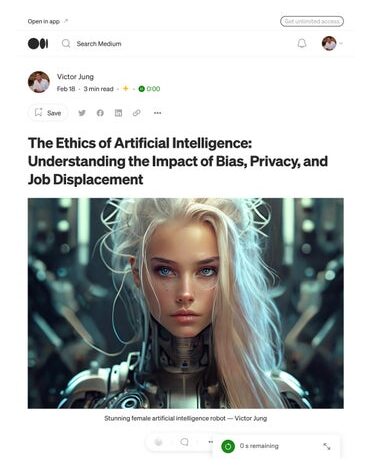AI Ethics: Navigating Bias, Privacy & Job Displacement

The Algorithmic Tightrope: Navigating the Ethics of Artificial Intelligence
Artificial intelligence (AI) is rapidly transforming our world, promising unprecedented advancements in fields ranging from healthcare to transportation. However, this technological revolution isn’t without its complexities. Alongside the excitement and potential benefits lies a growing concern about the ethical implications of AI development and deployment. This post will explore some of these crucial considerations – bias in algorithms, privacy concerns, job displacement, and more – aiming to provide a comprehensive overview of the challenges we face as we integrate AI into our lives.
The Pervasiveness of Bias: Ensuring Fairness in AI
One of the most pressing ethical issues surrounding AI is algorithmic bias. AI systems learn from data; if that data reflects existing societal biases, the resulting AI will perpetuate and even amplify them. This isn’t about malicious intent – it’s often an unintentional consequence of using historical data that already contains inequalities.
How does bias creep into AI? Consider a facial recognition system trained primarily on images of light-skinned individuals. It may perform poorly, or even misidentify, people with darker skin tones. Similarly, if a hiring algorithm is trained on resumes predominantly featuring male candidates in leadership roles, it might unfairly penalize qualified female applicants.
Addressing algorithmic bias requires a multi-faceted approach:
* Data Auditing and Diversity: Carefully examining training datasets for biases and ensuring they represent diverse populations is crucial. This includes not only demographic diversity but also diversity in viewpoints, experiences, and outcomes.
* Algorithmic Transparency: Understanding how an algorithm arrives at its decisions (interpretability) can help identify potential biases. “Black box” AI systems are particularly problematic from an ethical standpoint.
* Bias Detection Tools: Developers are creating tools to specifically detect and mitigate bias within algorithms. These tools analyze data, model performance, and decision-making processes to highlight disparities.
* Continuous Monitoring & Evaluation: Even with careful initial design, biases can emerge over time as the AI interacts with new data. Ongoing monitoring and evaluation are essential to identify and correct these shifts.
Privacy Under Siege: Data Security and Algorithmic Surveillance
AI thrives on data – vast quantities of it. This dependence raises serious privacy concerns. Many AI applications rely on personal information, from medical records to browsing history, to function effectively. The potential for misuse or unauthorized access is significant.

The rise of surveillance AI: Facial recognition technology, predictive policing algorithms, and sentiment analysis tools all have the capacity to create pervasive surveillance systems. While some applications may be beneficial (e.g., identifying missing persons), they also pose a threat to civil liberties and freedom of expression.
Key privacy considerations include:
* Data Minimization: Collecting only the data that is absolutely necessary for a specific purpose, avoiding the temptation to gather everything just in case.
* Anonymization & Pseudonymization: Techniques to remove or obscure identifying information from datasets. However, it’s important to note that anonymization can be challenging and may not always be foolproof (re-identification attacks are a growing concern).
* Data Security Measures: Robust security protocols to protect data from breaches and unauthorized access.
* User Consent & Transparency: Providing individuals with clear information about how their data will be used and obtaining their informed consent. Regulations like GDPR (General Data Protection Regulation) are attempting to address these issues, but ongoing vigilance is required.
The Future of Work: AI and Job Displacement
Perhaps one of the most widely discussed ethical concerns surrounding AI is its potential impact on employment. As AI becomes capable of performing tasks previously done by humans, there’s legitimate fear of widespread job displacement.
While AI will undoubtedly automate certain jobs, it’s not necessarily a zero-sum game: AI can also create new jobs and augment existing ones.
However, the transition won’t be seamless. We need to proactively address potential negative consequences:
* Reskilling & Upskilling Initiatives: Investing in programs that equip workers with the skills needed to thrive in an AI-driven economy – focusing on areas like data science, AI development, and roles requiring uniquely human qualities (creativity, critical thinking, emotional intelligence).
* Social Safety Nets: Exploring options like universal basic income or expanded unemployment benefits to provide a safety net for those displaced by automation.
* Focusing on Human-AI Collaboration: Designing AI systems that complement and enhance human capabilities rather than simply replacing them. For example, using AI tools to assist doctors in diagnosis or lawyers in legal research.
Accountability & Responsibility: Who is to Blame When AI Makes a Mistake?
When an AI system makes a mistake—whether it’s misdiagnosing a patient, making a flawed investment decision, or causing an accident—who is responsible?
Determining accountability in the age of AI is complex:
* Developers: Are developers liable for flaws in their algorithms? The extent to which they can be held accountable remains a subject of debate.
* Deployers: Those who deploy and use AI systems bear some responsibility for ensuring they are used safely and ethically.
* The AI Itself?: Assigning legal personhood or liability to an AI system is currently not feasible, but the question may arise as AI becomes more sophisticated.
Establishing clear ethical guidelines and regulatory frameworks is crucial for assigning responsibility and preventing harm:
Conclusion: Shaping a Future Where AI Benefits All
The ethical considerations surrounding AI are multifaceted and evolving. Ignoring these issues risks creating systems that perpetuate biases, erode privacy, and exacerbate existing inequalities. However, by proactively addressing these challenges—through careful data auditing, algorithmic transparency, thoughtful policy-making, and a commitment to human-centered design—we can harness the transformative power of AI while mitigating its potential harms. The future of AI isn’t predetermined; it’s up to us to shape it responsibly, ensuring that this powerful technology benefits all of humanity.



